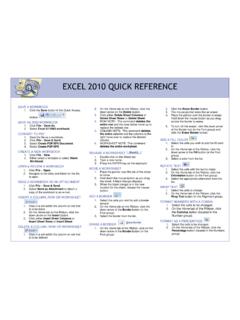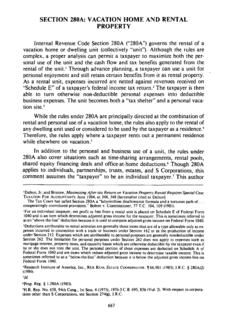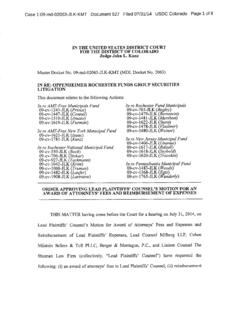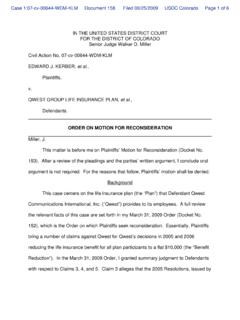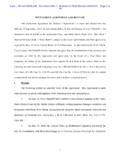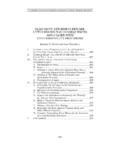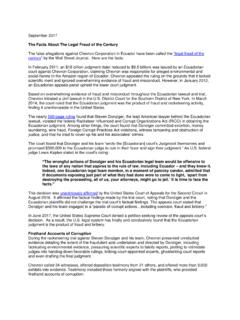Transcription of Analysis of Warranty Claims Instituted by Non-Privity ...
1 AN Analysis OF Warranty Claims Instituted BY NON-PRIVITYPLAINTIFFS IN JURISDICTIONS THAT HAVE ADOPTED UNIFORMCOMMERCIAL CODE SECTION 2-318 (ALTERNATIVES B & C)byWILLIAM L. STALLWORTH*I. INTRODUCTIONIn an earlier Article,' the author identified legal principles that explain and harmo-nize the cases decided under section 2-318, Altemative There are no comprehensivecommentaries on the other two versions of Uniform Commercial Code section 2-318("section 2-318"). Hence, the purpose of this Article is to discuss case law developmentsunder Alternatives B3 and The Article will also propose a solution to various prob-lems that arise under section 2-318 in the the law of defenses.
2 In order to follow thisdiscussion, one must understand the law of Warranty Claims and defenses underArticle2 of the Uniform Commercial Code (henceforth, the "Code" orthe "UCC"). In an earlierArticle5 the author presented a capsule summary of the law in that area, and the readermay wish to refer to that Article.* Assistant Professor of Law, University of Dayton School of Law; , Stanford University, 1982; , HarvardLaw School, 1979; , Cornell University, 1970. The author wishes to acknowledge the support of colleagues andstudents at the University of Dayton School of William L. StallworthAn Analysis Of Warranty Claims JnstitutedByNon-privilyPlaintiffs In JurisdictionsThat Have Adopted Uniform Commercial Code Section 2-318 (Alternative A), 20 PEPP.
3 L. REV. 1215 (1993).2 Alternative A provides that:A seller's Warranty whether express or implied extends to any natural person who is in thefamily or household of his buyer or who is a guest in his home if it is reasonable to expect that suchperson may use, consume or be affected by the goods and who is injured in person by breach of thewarranty. A seller may not exclude or limit the operation of this 2-318 (1992).A majority of the states have adopted Alternative A. See 2 WILLIAM D. HAWKLAND, SERIES 2-3 18, at 666n. 1 (1992) [hereinafter HAWKLAND]. See also JAMES J. WHITE & ROBERT S. SUMMERS, UNIFORM COMMERICALCODE, 11-3, at 460 (3d ed.)
4 1988). See infra app. A for a list of the states that have adopted Alternative B provides that: "A seller's Warranty whether express or implied extends to any natural person whomay reasonably be expected to use, consume or be affected by the goods and who is injured in person by breach ofthe Warranty . A sellermay not exclude or limit the operation of this section." 2-318 (1992). See infra for a list of the states that have adopted Alternative C provides that:A seller's Warranty whether express or implied extends to any person who may reasonably beexpected to use, consume or be affected by the goods and who is injured by breach of the seller may not exclude or limit the operation of this section with respect to the injury to the personof an individual to whom the Warranty 2-318 (1992).
5 See infra app. A for a list of the states that have adopted Alternative C.' See supra note LAW REVIEWA. Summary and OverviewThis Article will reach the following conclusions. In Warranty actions decided underAlternative B, the lack of privity defense prevails unless the section 2-318 plaintiff , issuing to recover for personal By comparison, under Alternative C, the lack ofprivity defense fails unless the plaintiff is someone whom the seller would not haveexpected to use, consume or be affected by the goods.' It is uncertain whether variousCode defenses are available in section 2-318 litigation. For example, the courts seemto be reluctant to permit the Code's lack of notice defense to be used in personal Similarly, some cases suggest that the courts disfavor Code defenses based onwarranty disclaimers or remedy limitations;10 but other cases enforce such disclaimers,even in personal injury cases.
6 11 There is an analogous split of authority on the questionwhether the Code statute of limitations or the tort statute of limitations applies to apersonalinjury actiontried on abreachof Warranty ThisArticle ultimatelytakesthe position that defenses based on Code notice requirements, remedy limitations, war-ranty disclaimers and the statute of limitations should be effective against section 2-318third party Defenses to Breach of Warranty Claims1. The Defense of Lack of PrivityThe defense of lack of privity is the primary obstacle to a Warranty claim filed bya plaintiff who is not in privity of contract with the defendant.
7 "Privity of contract" isthe connection or relationship that exists between contracting For example, abuyer and seller are said to be "in privity of contract," or simply "in privity." Thus, lackof privity problems are disputes about whether various Non-Privity plaintiffs have stand-ing to sue for breach of contract. There are two kinds of lack of privity-"vertical" lackof privity and "horizontal" lack of privity. 4I This Article uses terms like "section 2-318 litigation" and "section 2-318 plaintiffs" as a convenient way to referto the litigation and to the Non-Privity plaintiffs who file Claims under 2-318. Technically, 2-318 confers standingto sue under other provisions of the Code ( , 2-314) and does not provide an independent cause of discussion infra parts 1 discussion infra parts infra part See infra part See infra part See infra part See 4 ARTHUR L CORBIN, CORBIN ON CONTRACTS 778 (1951 & Supp.)
8 1991); 8 SAMUEL WILLISTON, ATREATISE ON THE LAW OF CONTRACTS 998(A) (3d ed. 1964 & Supp. 1992).14 See WHITE & SUMMERS, supra note 2, at 460.[Vol. 27:2 Warranty Claims Instituted BY NoN-PRIvrrY PLAINTIFFSThe problem of vertical lack of privity arises when a purchaser files a breach ofwarranty action against a vendor in the distribution chain who is not the immediateseller. 15 The problem of horizontal lack ofprivity occurs when a non-purchaser sues anyvendor in the chain of distribution for breach of warTanty. 6 The lack ofprivity defense can produce harsh results, and for that reason the defensehas been undermined by case law developments,17 the doctrine of strict liability in tort, 1and federal and state Section 2-318 is an example of state legislation thathas weakened the vitality of the privity defense.]
9 "C. Common Law Third Party Beneficiary TheoryAt common law a third party not in privity who wishes to sue on a contract has toprove thathe orshe is an "intended" beneficiary2' of the contract rather than an "inciden-tal" beneficiary22 because incidental beneficiaries lack standing to enforce the For example, when the woman who bought a defective lawnmower from a department store sues the companythat manufactured the lawnmower for breach of implied Warranty . Vertical Non-Privity plaintiffs are often referredto as "remote" purchasers because they did not buy directly from the defendant seller. Alternatively, the defendantsellers in vertical lack of privity cases are often referred to as "remote" sellers because they did not sell directly tothe plaintiff purchasers.
10 " For example, when the man who is injured when he falls off a lawnmower sues the department store where hiswife bought the lawnmower, or the company that manufactured the lawnmower, or both companies; or when theemployee who is injured by some heavy machinery sues the company that sold the equipment to her employer, or thecompany that manufactured the equipment, or both companies." For example, the common law created exceptions to the privity requirement for certain kinds of products: "(1)first, dngs and articles of food and drink (products of intimate internal bodily use); then (2), by analogical extension,toiletry and cosmetic articles (products of intimate external bodily use).



